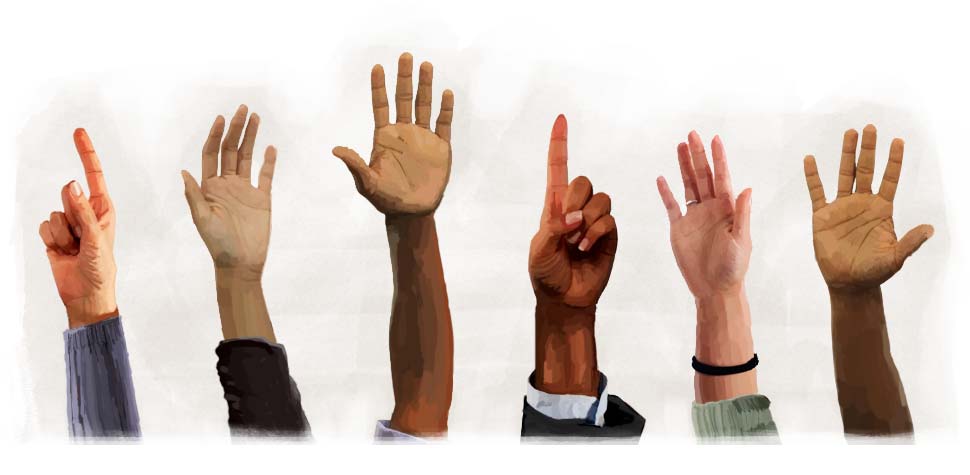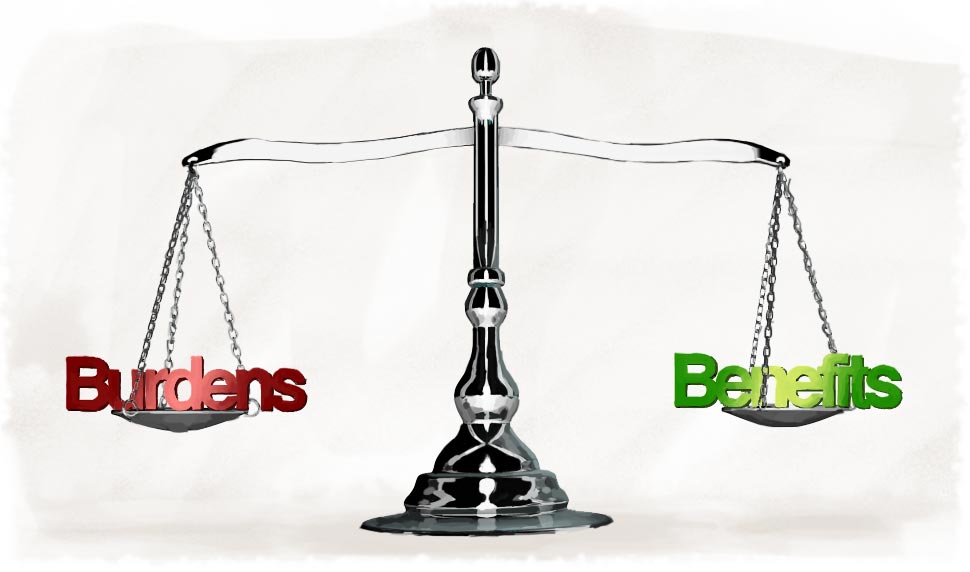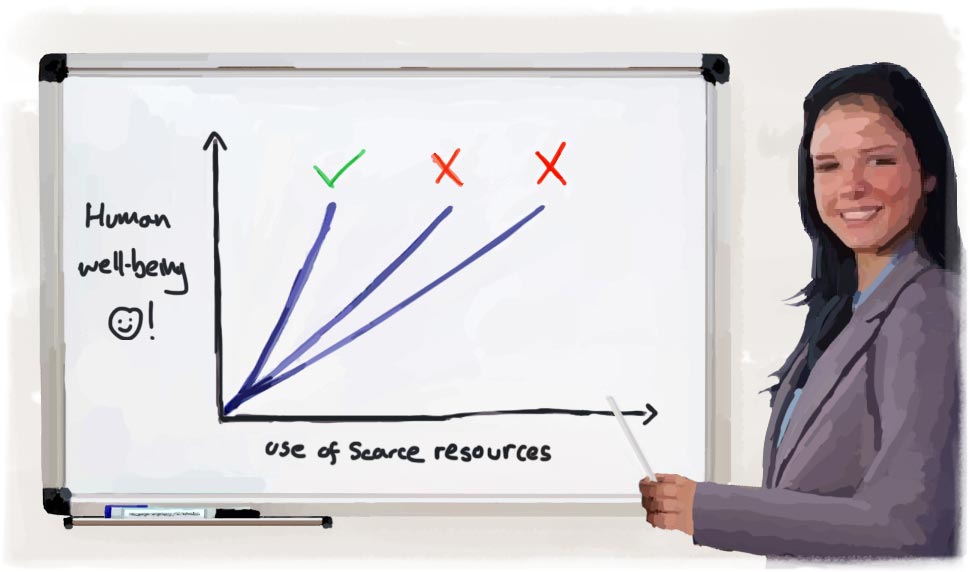Values
When thinking about a desirable economy it is important to be clear from the very start about our goals, about what kind of human beings we want to become, and what principles and values we want our economy to be based on. Only then can we begin to form economic institutions and decision making procedures, and to assess the degree to which they achieve our goals and why they presumably are better than possible alternatives.
A participatory economy is an economy that strives for democracy, justice, solidarity, diversity, efficiency and environmental sustainability.
Economic Democracy
When we look at the decision making norms in most workplaces today, typically a minority at the top, made up of the management, make the important decisions, while workers lower down in the hierarchy carry out the orders. Most workers have very little say over the running of the workplace or meaningful control over their work lives. Hierarchical decision making structures in the political system, labelled authoritarianism or dictatorships are no longer tolerated in most parts of the world. So if we reject the idea of a political elite dictating our lives and we value democracy, then it should be applied to all domains of social life, including the economy. But what exactly do we mean by economic democracy?
One interpretation is that everyone should be free to do whatever they want with their person and property, including the right to enter into any contract they wish with anyone else. This is usually referred to as economic freedom. A major problem with this definition is that the economic freedom of one person often conflicts with the economic freedom of another person. For example, when a person is free to pollute, it effects the freedom of others not to be polluted; If banks and financial institutions are free to gamble recklessly, citizens are not free to save safely or live in a crisis-free environment.
Another concept of economic democracy is majority rule. The first problem with this norm is that it tells us nothing about who should have a vote in a particular decision. The other problem with majority rule is that many decisions affect some people more than others, which means that those more affected by a decision can find themselves overruled by those who are less affected, or not affected at all. So, while the concept of majority rule may work well if decisions affect us all equally, it doesn’t work well for the overwhelming number of decisions that affect some more than others.
 Supporters of participatory economics therefore think that economic democracy should be defined as a say in decision making in proportion to the degree one is affected by the outcome of a decision. If you are affected more than others by a decision, then you would have more say than they do; if you are affected less, you would have less say than they do. Advocates of participatory economics call this self-management. Self-management maximises human freedom by giving people control over their lives. The capacity to analyse and evaluate the consequences of our actions, choose among alternatives based on our assessments, and the ability to act on them are important human needs that a Participatory Economy would seek to fulfil.
Supporters of participatory economics therefore think that economic democracy should be defined as a say in decision making in proportion to the degree one is affected by the outcome of a decision. If you are affected more than others by a decision, then you would have more say than they do; if you are affected less, you would have less say than they do. Advocates of participatory economics call this self-management. Self-management maximises human freedom by giving people control over their lives. The capacity to analyse and evaluate the consequences of our actions, choose among alternatives based on our assessments, and the ability to act on them are important human needs that a Participatory Economy would seek to fulfil.
Economic Justice
Entering into economic co-operation with others involves incurring burdens and receiving benefits. In today’s societies, we have witnessed a tremendous rise in income and wealth inequality where the vast majority of the benefits of economic activity go to a small minority of people. In many countries, the richest 1% of the population own a significant proportion of the country’s total wealth and there is growing research showing a strong correlation between inequality and social problems including levels of crime and detrimental effects to human mental and physical health and well-being. But what is a fair distribution of the burdens and benefits of economic activity? There are four main distributive principles that have been put forward:
1. To each according to the contribution of their productive property
One concept is that people should get out of an economy what they and their productive possessions contribute to the economy. Productive property includes things like land, buildings, machinery or – what is the same thing – ownership of stocks in corporations.
The most common way productive property is acquired is through inheritance. According to this principle the grandson of a very wealthy family should be given many thousand times more in compensation than a highly trained, highly productive grandson from a working class family, even if the wealthy grandson doesn’t work a day in his life and the working class grandson works many years producing goods of great benefit to others. Having the fortune to be born into a wealthy family and inheriting ownership over economic assets is not a compelling moral argument for deserving greater income.
Other ways people acquire more productive property than others is through good luck, for example investing in shares of a rising or declining company or industry, or through unfair advantage; for example, through being stronger, better connected, having insider information, or being more willing to prey on others. Good luck or unfair advantage are no moral basis for receiving greater rewards.
But even if we assume that individuals can gain some greater ownership over productive property fairly through some meritorious means, there is still a major moral problem. Labour and credit markets enable owners of productive property to capture part of the efficiency increase in the productivity of other people, and turn them into permanently higher incomes that increase over time. For example, when an employer hires labour they pay them wages that are less than the full value they have produced working with the productive wealth, thus the owners gain part of the efficiency gains of the labourers’ work in profits. Ownership of productive capital, even if justly acquired, will transform into additional income that is far greater than is merited by any initial effort or sacrifice.
Every empirical study of the origins of wealth inequality concludes that differences in ownership of productive property which are gained within a single generation due to differences in sacrifices and/or differences in contributions people make themselves are quite small relative to the differences in wealth that are due to inheritance, luck, unfair advantage and accumulation. This means that the vast majority of income gained from property cannot be considered just.
“You may set it down as a rule that the rich, the possessors of great wealth, had no moral right to it based upon desert, for either their fortunes belonged to the class of inherited wealth, or else, when accumulated in a lifetime, necessarily represented chiefly the product of others, more or less forcibly or fraudently obtained.Edward Bellamy, 1888, looking forward
2. To each according to the contribution of their personal labour
Many people agree that most property income is unfair, but maintain that all have a right to what they call the “fruits of their own labor.” The reasoning is that if my labor contributes more to the social product I should receive more. While this sounds good on the face of it, it suffers from the same reasons for rejecting income based on ownership over productive property. This is because most differences in people’s personal productivities depend on factors over which they have no control. For example the value of what people produce depends largely on the number of people working in each labour category or industry, changes in consumer demand, the quantity and quality of other complimentary units such as machinery and tools, and most importantly, the intrinsic qualities of people themselves. However productive a strong physique or a high IQ may be, that doesn’t mean that the owner of this trait deserves more income than someone else less gifted but that works as hard or sacrifices as much. The ‘genetic lottery’ is no more fair than the ‘inheritance lottery’.
3. To each according to their effort or personal sacrifice
The only thing a person has control over is how much effort they choose to expend, whereas people cannot decide to be tall or intelligent, or influence external factors they have no control over. It is commonly considered unjust to punish someone for something that they cannot affect. Since each participant bears burdens as well as enjoys benefits, it is equalisation of net benefits, meaning benefits enjoyed minus burdens borne, that makes the economic cooperation fair. Only then will an economy treat all participants equally by giving equal importance to everyone’s differing priorities. All workers have equal freedom to choose whether to work longer and receive greater income, or work less and enjoy more leisure time, but either choice results in the same net benefits.
In a participatory economy the goal is that compensation should be based on effort or personal sacrifice. This can take many forms, such as longer work hours, less pleasant work, or more intense, dangerous and unhealthy work.
4. To each according to their need
Obviously, there will always be some in any economy who are unable to make contributions, such as some people with severe disabilities, and some who should be exempted from doing so even if they are able, for example children and retirees, and therefore receive an income nonetheless. There are also situations where it is considered humane that individuals should be provided with greater access to goods or services than warranted based on the sacrifices they have made. For example, those who require greater medical care or are victims of a natural disaster.
Supporters of participatory economics believe that ignoring differences in sacrifice would be unjust. However, ignoring differences in need in some circumstances would be inhumane. Therefore, the complete distributive principle of a participatory economy is to each according to their effort or personal sacrifice, and need.
Solidarity
The logic of our current economy is such that our interests are pitted against each other, so that for one person to get ahead it is often at the expense of someone else. In contrast, a Participatory Economy seeks to create conditions that reveal how our interests are intertwined, so that for one person to advance we all advance in the spirit of mutual-aid, co-operation and solidarity.
Solidarity is defined here as concern for the well-being of others and granting others the same consideration in their endeavours as we ask for ourselves.
The ties in a society that bind people together as one have been a powerful creator of human well-being throughout mankind’s history. It is clear that for human beings, cooperation is an important part of human life and we should try to organize economic institutions to encourage instead of discourage people from acting out of solidarity with others.
Diversity
Diversity refers to people having a large variety of choices to fulfil their needs and desires. Since humans show a large variety in preferences, tastes, potentials and lifestyles, the best life for one is not necessarily the best life for another. Variety adds to the richness of all our lives. A participatory economy rejects conformity, homogenisation and regimentation in favour of flourishing diversity in our lives.
The other benefit valuing diversity brings is not placing all our eggs into one basket. It is important to experiment with different ideas, explore different options, and encourage minority viewpoints, in case one path followed turns out to be wrong.
Efficiency
Many people who are critical of the present economic system are turned off by the word ”efficiency”. This is for two reasons: many seem to think that the word efficiency is the same as profit maximisation – which it is not, and secondly, we are often told that the virtue of free markets are that they are efficient – which they are not. For example, an efficient economy would not result in global warming, financial crises, booms and busts and persistent unemployment.
Efficiency means meeting our economic goals, with as little waste of resources, time, labour and energy as possible. A participatory economy seeks to be an efficient economy, to maximise human well-being for all, so that we don’t squander our scarce resources, or needlessly waste our time and energy performing burdensome labour or doing jobs with no social value.
Environmental Sustainability
Our other stated values already implicitly contribute to our understanding of sustainability. For example, if an economy uses up natural resources too quickly, leaving too little for later, it is not efficient; if an economy sacrifices the needs of future generations to fulfil the desires of those in the present generation, it has violated intergenerational justice; if we destroy our tropical jungles, forests and ecosystems, we have lessened, not increased diversity.
However, supporters of participatory economics see environmental sustainability as more than just following on from the values already stated above. Valuing and caring about our natural environment is an important value in and of itself. A participatory economy is therefore a green economy that seeks to meet our economic needs without diminishing the ability of future generations to meet their needs and continue to progress. This means leaving future generations conditions at least as beneficial as those we enjoy today.
After defining a set of values or goals for a desirable economy to be based on, institutions can be designed for achieving them. Please continue reading to see how the institutions of a participatory economy are designed to further economic democracy, justice, solidarity, diversity, efficiency and environmental sustainability.




